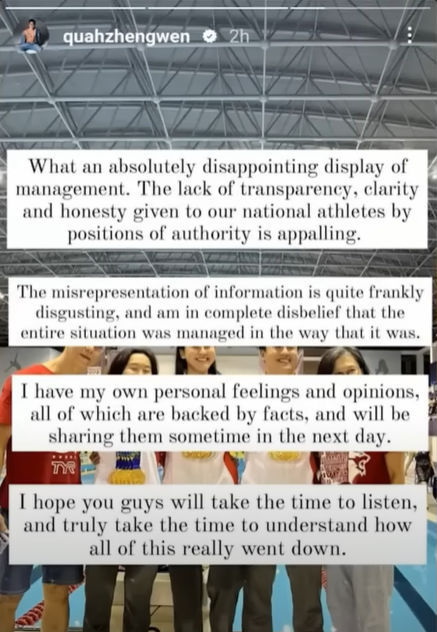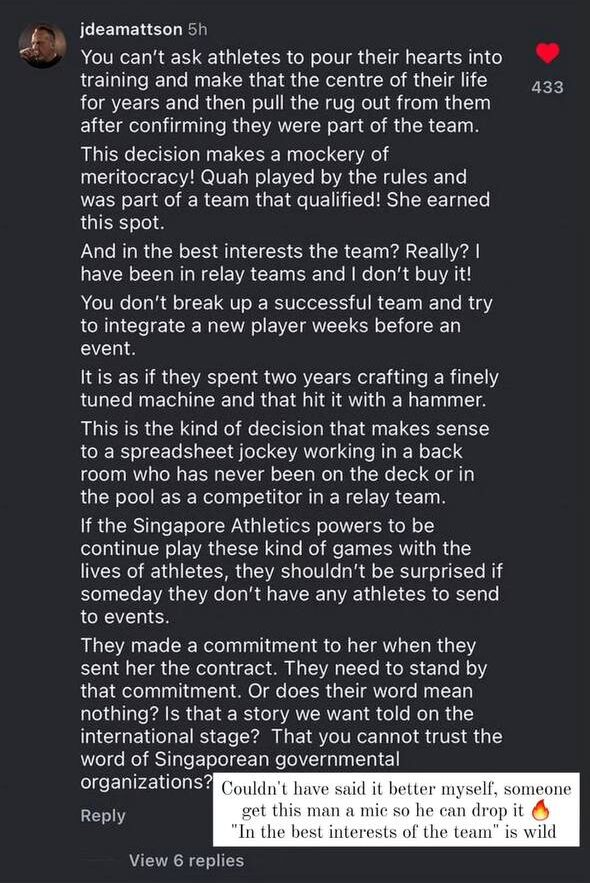Last Updated on 2024-07-11 , 9:01 pm
With the Paris Olympics looming right around the corner, it is one of the hottest topics in town right now with names to look out for like kitefoiling Max Maeder and track star Shanti Pereira.
However, some drama has brewed in Singapore over the team we are sending to France at the end of July.
You may have already heard that swimmer Quah Ting Wen’s appeal for the Olympics was rejected on 8 July 2024.
For those of you who are confused about what happened here, don’t worry – I gotcha.
If you prefer to watch a cat explain the situation instead, here’s a video we’ve done:
Still here and prefer to read? Here you go.
Qualification for the Olympics
Let’s start from the beginning.

Quah Ting Wen, together with her sister, Jing Wen, Levenia Sim and Letitia Sim qualified for the 2024 Paris Olympics back at the World Aquatics Championships in February earlier this year.
It was a historic Olympic berth as the sister pairs clocked 4 min 2.88 sec in the 4x100m medley relay heats on 18 February 2024.
View this post on Instagram
Although they finished in ninth place overall, missing out on a place in the finals, this swim was a new national record and earned them the qualification for a spot in the Olympic Games.
So you might be wondering at this point, how do people qualify for the swimming events at the Olympics?
The primary ways for most swimmers to qualify is to meet the Olympic Qualification Time (OQT) or be invited after achieving an Olympic Consideration Time (OCT).
Athletes who achieve the OQT, aka the “A” cut, for a particular event will immediately qualify for the event.
If the qualification period passes and the total of 852 athletes has not been met, athletes who have equalled or bettered the OCT, or “B” cut, will be invited to compete until the quota has been met.
TLDR; the first batch of qualifiers come from the people who meet “A” Cut and if they have extra space, they’ll call the “B” cut folks.
Of the original women’s swimming quartet, only Letitia Sim met the “A” cut in the 100m Breaststroke.
The rest of the team were considered relay-only swimmers.
World Aquatics states that each relay team can field up to two relay-only swimmers, but made a special exemption for the Singapore team to have three.
That means, by right, Singapore should have two swimmers who are also swimming for individual events, but with that quartet, we only have one.
Singapore Aquatics Asked to Choose
This is where things get a little complicated, so I hope you’re still with me.
Remember how after the qualification period, invitations are sent out to “B” Cut athletes?
A “B” Cut invitation was sent to another swimmer, 20-year-old Gan Ching Hwee for meeting the OCT in the women’s 1,500m freestyle with her national record of 16 min 10.61 sec.
Because of this, Singapore Aquatics (SAQ) had to choose between accepting Gan’s OCT invitation or going with the exceptional invite for the three relay-only swimmers.
SAQ’s selection criteria saw that since the relay team did not meet the two relay-only swimmer requirements, Gan’s OCT invitation was given priority.
Basically, Gan’s OCT invitation meant that she could now swim in the relay and Singapore no longer needed the special offer for a third relay-only swimmer.
After considering “all permutations for the best outcome”, the SAQ decided on the following line-up:
- Backstroke – Levenia Sim
- Breaststroke – Letitia Sim
- Butterfly – Quah Jing Wen
- Freestyle – Gan Ching Hwee
Thus booting Quah Ting Wen from the original relay team since she was initially slated to swim the freestyle leg.
Quah and SAQ’s Appeals Rejected
Following this decision, Quah Ting Wen appealed to the SAQ Appeals Committee.
In a press statement, SAQ said that her appeal was heard by its appeals committee on 7 July but was unsuccessful.
SAQ said they had also appealed to World Aquatics to reinstate an extra relay-only slot, which would allow both Quah and Gan to compete, but was also rejected.
SAQ President, Marc Chay, said that it would have been ideal if they could have sent six athletes to the Games but will have to respect the decision and hopes everyone can get behind the team.
He also stated that the association understood her disappointment and empathised with her.
He shared that they looked forward to Quah “being an important part of our 2025 plans when we host the World Aquatics Championships and compete in the SEA Games.”
Quah’s Response
Needless to say, this is a disappointing turn of events for the 31-year-old as she said this would probably have been her fourth and last Olympic Games.
Speaking in an interview with CNA, Quah appeared crestfallen as she described that it had been a long two to three days writing appeals and that she was very tired.
Initially thinking that the 2024 Games could be a nice way to end her career, she said, “I really don’t want to walk away from the sport with this being my last experience with it.”
Quah feels that this rollercoaster takes away from their accomplishment in Doha, wherein the team wanted to see how far they could push it in Paris.
This disappointment extends to her family, as she shared that her family fights each others’ battles more ferociously than they would fight their own.
This was evident as Quah Zheng Wen took to social media to share his thoughts on the issue, where he said that it was “an absolutely disappointing display of management” with a “lack of transparency, clarity and honesty given to our national athletes”:

He shared another screenshot of a fan’s comment and said that he deserved “a mic drop”:

Not the First Time Something Like This Has Happened
Quah shared that something similar had happened before wherein because of the way the policy was worded, a messy situation ensued.
Back in 2020, Quah was picked to go to the Tokyo Olympics through a universality placing based on her World Aquatics, formerly Fina, ranking.
Universality placings are another method to qualify for the Olympics.
Universality places are offered to National Olympic Committees like SAQ if they don’t have any qualified athletes or relay teams, as long as they have competed in one or more of the World Championships.
Two days after Quah was picked, Fina had sent a “B” cut invite to Gan.
Feeling some deja vu yet?
However, in that situation, Quah had the decision overturned with an appeal as they considered the Fina priority order, wherein universality places took precedence over “B” cut invites.
Unfortunately, things aren’t in her favour this time around.
She said that SAQ could have been clearer and more definitive about who it would be sending to the games.
She continued by sharing that she would say the same thing that she said three years ago which is that she does not want this to ever have to affect anyone again.
Hopefully, that will be the case.




